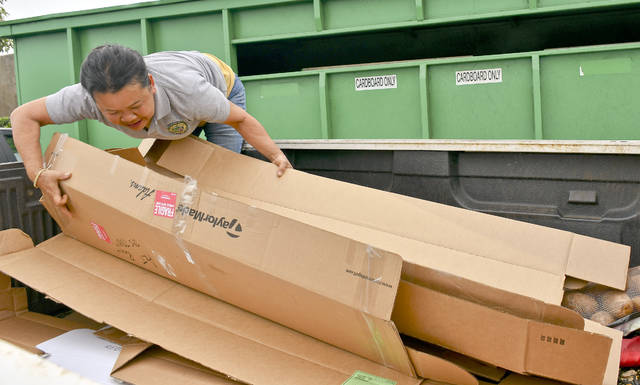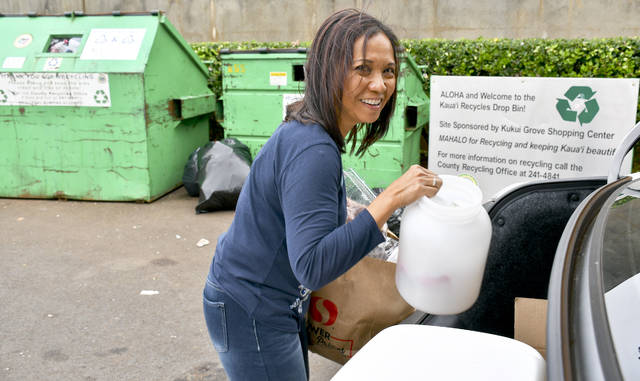LIHUE — Plate lunch trays and deli dishes once enjoyed a space on Kauai’s reclyclables list, but many of them are now going straight into the landfill instead.
The Kauai Recycles Residential Drop Bin Program announced Monday it is no longer accepting plastic trays and clamshells. Small, plastic food tubs are also not being accepted.
The decision to restrict plastic recycling is part of an ongoing issue nationwide, according to a county release, as China stopped accepting post-consumer recyclables from other nations starting in January, and the markets for plastic resins have become more restrictive.
“This is a major issue for all recyclers and municipalities throughout North America, and may have unknown and drastic impacts on programs in the U.S.,” said Lyle Tabata, acting county engineer.
Solid Waste Program Development Coordinator Allison Fraley said all recyclables that the county has traditionally collected have been sent to China via the contractor Garden Isle Disposal, Inc. (GID), with the exception of metals and glass.
Ferrous metals are processed through Resource Recovery Solutions out of Puhi Metals, and aluminum is sent to American market. Beverage containers are shipped to California to make new bottles, and non-HI5 glass (wine bottles, food jars, liquor bottles), are crushed in a glass processing machine by GID and used on island for projects such as backfill and pipe cushioning.
The program is continuing to accept No. 1 and No. 2 plastic bottles and jars. No. 1 and No. 2 plastic bottles and jars will continue to be accepted at all Kauai Recycles Drop Bins, and HI5 plastic beverage containers — labeled with HI 5 cents, HAWAII 5 cents, and Hawaii 5 cents — will continue to be accepted at all redemption centers.
That’s helpful for Anna Myers, Princeville resident and part of a growing movement on Kauai’s North Shore dedicated to promoting recycling islandwide.
“There’s about seven of us ladies and we’re just regular folks that want to make a difference and make our island better with recycling,” Myers said. “We’ve been brainstorming.”
Each of the people in the small collection of North Shore community members has a different take on the mission, and together they are hoping to do things like amp up recycling efforts at libraries and promote daily e-waste recycling opportunities with the county.
“My big thing so far is that I’ve adopted some of the trash cans at Hanalei Bay,” Myers said. “I have a list of people who collect redeemables for fundraisers and found places I can call to come get them if the cans get too full.”
Myers said she got the idea while she was out walking near Hanalei Bay.
“A lot of people don’ t know that anyone can take the redeemables out of those cans,” she said. “So one day I noticed there was a can of redeemables that was full and no one was taking it.”
Hanalei Canoe Club and the Hanalei School Parent-Teacher Association are just two examples of organizations that use redeemables for fundraising.
Myers even contacted Fraley and got new lids for the cans that specify them as redeemable receptacles.
“The biggest thing is that they weren’t being emptied and then that they were being used as trashcans, not as recycling,” Myers said. “Now I just go down there once a week or so, it’s part of my walk.”
Fraley said that kind of community input and volunteerism is “invaluable,” and that she’s impressed by the group’s enthusiasm.
“While individual efforts to recycle are important, and what makes our programs tick, these ladies are going above and beyond, and want to help develop and promote programs in their community,” she said.
The group’s next project begins on March 1, with an effort that will throw the spotlight onto Rieslings and Rosés with a recycling campaign aimed at wine bottles.
“There are so many (wine bottles) that are just thrown in the trash. They’re heavy and bulky and just get tossed,” Myers said. “We want March to be Recycle Wine Bottle Month on the North Shore.”
While the group still advocates the importance of recycling all glass, the hope is that a focus on wine bottles will introduce newcomers to recycling and remind those who already recycle to continue their practices.
“Maybe with a focus on wine bottles for a month, people will keep up recycling them after March is over,” Myers said.
Kauai’s landfill is already bursting at the seams with an estimated accumulation of 86,900 tons every year, and decision-making is ongoing on a new $65 million facility for the island’s garbage.
While those discussions are happening, officials with the county’s solid waste division encourage recycling as a way to curb the flow of waste into the landfill. The current waste diversion rate is around 40 percent and the goal is to achieve 70 percent diversion by 2020.
A curbside residential recycling program helped for a while, but the cost became problematic, according to the county. Cost for the curbside recycling program was between $10 million and $20 million, including trucks and bins.
Before the recent restructure, Kauai was recapturing 63 tons of plastic per year through the Kauai Recycles Drop Bins as opposed to almost 400 tons per year of bottle plastics through the HI5 redemption program.
Of the 63 tons accepted in Kaua‘i Recycles, it is estimated that about a third of this is trays and clamshells, so about 20 tons per year.
“This is a very small amount of material considering that the average amount of material that is landfilled in Kekaha is 205 tons per day,” Fraley said. “So, what we are able to capture for an entire year of this material type is equivalent to one-tenth of one day’s worth of trash deposited at the landfill.”
And while plastic trays and clamshells are now on the list of non-recyclables on the island, county officials said there is a silver lining in the change-up with the Kauai Recycles Program.
All post-consumer products that are being collected are still being baled, marketed and shipped off-island, according to Fraley, and recycled into new markets.
“On a positive note, Kauai Recycles locations can now receive newspaper along with mixed paper, which will increase convenience for recycling these items and open up more space at the drop bin locations,” officials said in a press release to TGI.
On the North Shore, Myers and her group of recycling advocates are focused on making sure the community is up to speed on what they can recycle.
“All of us, we think it’s most important that the community all over the island gets more educated about what’s redeemable and what’s recyclable,” Myers said.





Sad truth is our remoteness makes most recycling inefficient. A lot of people care about the aina here, but it doesn’t matter in the case of recycling. Now that China doesn’t want our old plastic, there’s gonna be a lot more stuff going to the landfill. And wine bottles don’t get recycled here ladies..get crushed.
What did the mayor come up with? Business
I’ve been recycling since the 1960s. I have so little rubbish that I don’t even have a collection bin. And I’d say that China’s decision to no longer take the so-called developed world’s plastic is more than an issue; it’s a full-blown crisis. And what will we do besides just sigh and continue to put things in the landfill?
Yes true recycling does help our environment. But when did you receive your check to clear out more plastics? Surely someone must have paid you some money. Convincing a bank? Why on earth would you work for free? It’s a job.
I am sad that we are not able to recycle the plastics that we were previously able to. Plastics are very bad.
I am concerned that our landfills will be responsible for the storage of too many things, and would prefer for these items to continue to be recycled. Restricting plastic recycling will lead to fuller landfills, which will lead to more of it ending up in the oceans and the stomachs of aquatic animals.
I am sad to watch the beauty of this island be DESTROYED, Owo but its ok we can always try to do more wecycle~~ 0.o we should look for mow cweative ways to wecycle.
It’s very tragic to see that China (which is one of our biggest trash exports) will no longer accept our plastics. This means that remote and isolated islands like our beautiful Hawaiian chain will have their landfills see exponential increases, and with that comes a lot of negative environmental impacts.
I’m primarily concerned about where all of our waste and recycled material ends up going after we get rid of it. One thing that I know for sure is that we’re definitely losing space on this island for landfills and the more we use, the more dangerous it is. I think we’re on the right track in terms of recycling, but we need some adjustment when it comes to the steps afterwards.
We produce and buy more plastic every year. Its time for consumers and businesses to start to take more responsibility. Our waste disposal problems on Kauai are nothing new. It’s a small island and our garbage has to go somewhere and Kekaha is just about tapped out. If we simply make the choice to buy less plastic, and furthermore demand our local businesses sell less plastic we’ll be doing much more for the ‘aina and the planet then just sending it off to China to deal with.